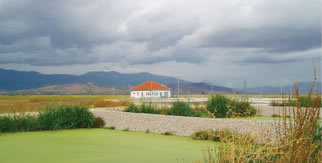
Training and Education
Non-Governmental Organizations: Enhancing Their Role in Advancing the New Water Infrastructure Paradigm
Publication Date: October 2010
Cooperating Institution: Coalition for Alternative Wastewater Treatment (CAWT)
Principal Investigator: Valerie Nelson
Project Budget: $129,700
Project Identifier: DEC9SG06
DESCRIPTION
The objective of this project was to enhance and strengthen the role of nongovernmental organizations (NGOs) in defining and implementing a new water infrastructure paradigm. Sustainable water management will increasingly incorporate new systems that use, treat, store and reuse water efficiently at small scales and that blend designs into restorative water hydrologies. Such approaches will help the existing centralized infrastructure adapt to emerging water shortages, financial shortfalls, energy constraints, and polluted environments. They also have been found to create multiple benefits for communities, in terms of water quantity and quality protection, air quality and public health improvements, property value increases, recreational space, and climate mitigation.
Changing an entrenched paradigm of institutions and practices requires an extended period of conversation and research among professionals, government, and the public, along with piloting of on-the-ground projects. Over time, these insights and experiences serve as the basis for broad policy and institutional reform to mandate or incentivize new approaches. While there is currently an interest in sustainability issues within the federal policy community, reform of the scope and nature required must entail a spreading of ideas and broad-based mobilization of support throughout the country.
This project created the foundation for increased civil society engagement in shifting the water paradigm at all three levels – national, state, and local. The following objectives were accomplished:
- Gaining support for 21st century water management concepts within the Clean Water Network, a national education and advocacy network of over 1,100 clean water organizations from around the country;
- Development of a new Water Alliance of multiple professional, utility, academic and environmental constituencies seeking to further 21st century water approaches in federal governance;
- Drafting of consensus statements and documents, which reflect the perspectives of professional stakeholders and which resonate with the values and concerns of the public and opinion leaders;
- Creation of an NGO-led multi-stakeholder alliance and agenda for reform in Massachusetts, an approach which can serve as a model for other state-level networks;
- Design of an education and outreach program for Cape Cod towns and for Boston, which can be models for assistance to other communities facing water crises and searching for alternatives nationwide.
Participants in the project have stated their intentions and mapped out their strategies for future collaborative work in stimulating and guiding the civic engagement required for a transition to sustainable water management.
Associated Documents:
Final Report

